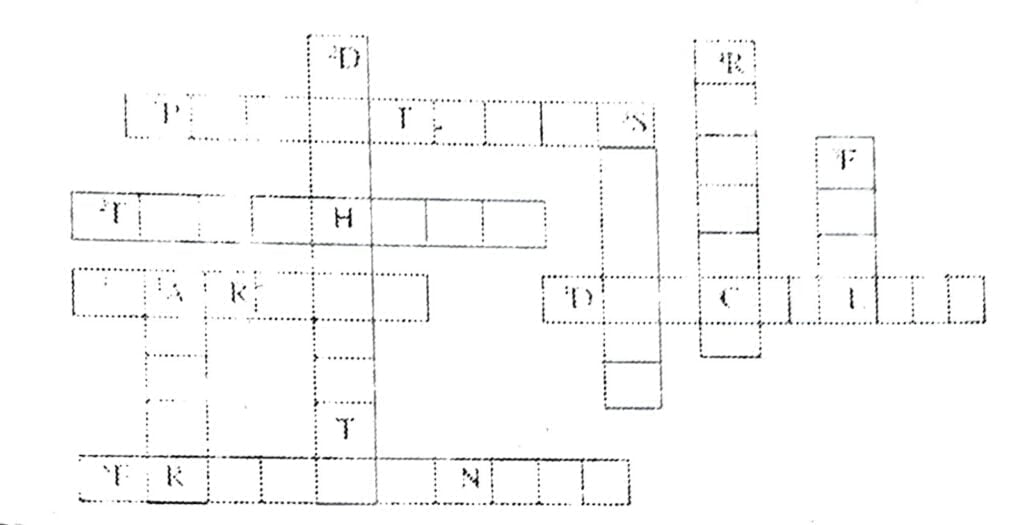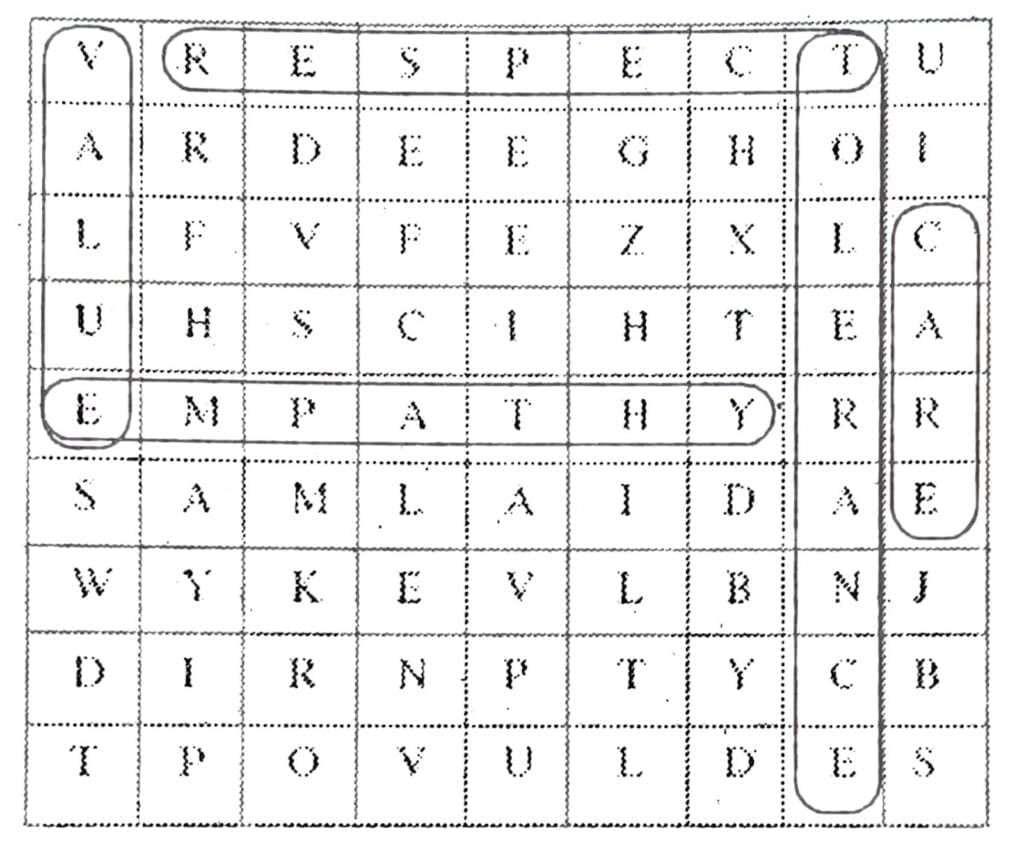NIOS Class 10 Home Science Chapter 21 Ethnics in Daily life Solutions to each chapter is provided in the list so that you can easily browse through different chapters NIOS Class 10 Home Science Chapter 21 Ethnics in Daily life and select need one. NIOS Class 10 Home Science Chapter 21 Ethnics in Daily life Question Answers Download PDF. NIOS Study Material of Class 10 Home Science Notes Paper 216.
NIOS Class 10 Home Science Chapter 21 Ethnics in Daily life
Also, you can read the NIOS book online in these sections Solutions by Expert Teachers as per National Institute of Open Schooling (NIOS) Book guidelines. These solutions are part of NIOS All Subject Solutions. Here we have given NIOS Class 10 Home Science Chapter 21 Ethnics in Daily life, NIOS Secondary Course Home Science Solutions for All Chapters, You can practice these here.
Ethnics in Daily life
Chapter: 21
[Book – II] HOME SCIENCE
TEXTUAL QUESTION WITH ANSWERS
Intext Questions 21.1.
Q. 1. Define the terms Ethics and Values.
Ans: Values are the ideas and beliefs we hold as special and those that we imbibe from our parents and immediate surroundings. Ethics are how we actually behave in a difficult situation that tests our values.
Q.2. Some good manners are listed below. Match Column A with Column B:
| Column – A | Column – B |
| 1. Speak to others | (a) When two people are talking |
| 2. Think before | (b) When talking to your parents |
| 3. Don’t interrupt | (c) Which can be understood by all in the group |
| 4. Never speak | (d) When talking about yourself |
| 5. Be respectful | (e) While sitting in a group |
| 6. Converse in the language | (f) i’ll of others |
| 7. Be humble | (g) You speak |
| 8. Do not whisper | (h) Cheerfully |
| (i) Successfully |
Ans:
| Column – A | Column – B |
| 1. Speak to others | (h) Cheerfully |
| 2. Think before | (g) You speak |
| 3. Don’t interrupt | (a) When two people are talking |
| 4. Never speak | (f) i’ll of others |
| 5. Be respectful | (b) When talking to your parents |
| 6. Converse in the language | (c) Which can be understood by all in the group |
| 7. Be humble | (d) When talking about yourself |
| 8. Do not whisper | (e) While sitting in a group |
Q. 3. Solve the following cross word puzzle:

Down
1. Feeling when you loose your temper ____________.
2. The opposite of honest is ____________.
3. Sheena is she does not ____________ like to share anything.
4. We should always show this to our elders ____________.
5. We should not use ____________ language.
Ans: (1) Anger.
(2) Dishonest.
(3) Selfish.
(4) Respect.
(5) Foul.
Across:
1. ____________ in a person’s speech shows that he has good manners.
2. Mahatma Gandhi was always ____________.
3. A person with ____________ attitude is liked by all.
4. We learn ____________ in school.
5. Ask for this if you do something wrong.
Ans: (1) Politeness.
(2) Truthful.
(3) Caring.
(4) Discipline.
(5) Forgiveness.
INTEXT QUESTIONS 21.2.
Give Short Answers
1. Do you think it was right for the farmer to take Rupees 10 from the little boy for just looking at the puppies?
Ans: No, farmer can’t take Rs.10 for looking puppies.
2. What according to you must the little boy had felt when he came to know that the pup was suffering from a physical defect in his limbs?
Ans: Little boy thought that good condition pup is bought anyone. But physical defect pup can’t buy anyone. So he think pup not alone.
3. Do you think that it was brave of the little boy to accept the pup with such a defect?
Ans: Yes, little boy is brave because he help the defective pup.
Q. 2. State if you agree or disagree with the following statements. Give reasons for your answer.
1. We can care for others as long as we are happy and contended. Agree/disagree.
2. Only intolerance and aggression can give what we want. Agree/disagree.
3. Education and good upbringing promotes us values. Agree/disagree.
4. Children from poor families cannot have values. Agree Disagree.
5. Showing tolerance and empathy are the keys for leading a peaceful life. Agree/disagree.
Ans: 1. Disagree. Caring for others is a value that does not depend upon mood or situations..
2. Disagree. Aggression may result in negative consequences.
3. Agree. Both education and good upbringing have a big role in developing values.
4. Disagree. Values are based on what we think is right or wrong, it has nothing to do with the amount of money we may have.
5. Agree. Tolerant rarely fight with others, which helps in building peaceful environment.
INTEXT QUESTION 21.3
Q. 1. From the grid given below find one word for the following sentences, which you have already read in this chapter. The words may be found diagonally, horizontally, vertically or reversed.
(a) The ideas and beliefs which we hold.
(b) We should show this not only to our elders but to our youngsters too.
(c) The ability to accept opinion and practices different from your own.
(d) Being sensitive to others needs.
(e) The ability to understand, recognize and share feeling that is being experienced by someone else.

Ans: (a) Value.
(b) Respect.
(c) Tolerance.
(d) Care.
(e) Empathy.
TERMINAL EXERCISES
Q. 1. Define the terms Values and Ethics with the help of examples from your daily life.
Ans. Values are ideas and beliefs we hold and are learnt from childhood. They are imbibed from our parents and immediate surroundings caring for others. Ethics test our values, it is the way we behave in difficult situations.
Q. 2. Where there are rights there are responsibilities too. Comment.
Ans. Where there are rights, there are responsibilities. Similar to your rights, your responsibilities are also mentioned in our constitution.
They are:
Every citizen should
(i) abide by the constitution.
(ii) cherish and follow the noble ideals which inspired our freedom, struggle.
(ii) defend our country and render national service when called upon to do so.
(iv) promote harmony and spirit of common brotherhood among people of different religion, languages and regions.
The basic thing to understand here is that we all have our rights but we also have the responsibility to respect others’ rights. Only if rights and responsibilities are taken together will there be peace and harmony sail round. It is everyone’s duty to see that rights are not misused in any way.
Q. 3. Why do you think there is a need for ethics in our daily life?
Ans: There will be total imbalance in the society, if all its members do not practice value and ethics. Crime and chaos will rule and life will become difficult. Hence, it becomes our responsibility ility as an individual to live
Q. 4. List down all the values you have learnt this chapter.
Ans: 1. Honesty and loyalty.
2. Respect for work.
3. Punctuality, regularity and discipline.
4. and politeness with others.
5. Judicious use of resources.
6. Taking initiatives.
7. Efficiency in completing tasks.
Q. 5. How can the ethics of work-place benefit the employee?
Ans: Benefits:
1. To may be help good and polite behavior.
2. To may be help to be disciplined.
3. To may be help be respect your job.
4. To may be help to do the job with feeling of services.
5. To may be help Team spirit.
6. To may be help knowing the job well.
7. To may be help Loyal to your organization.
Q. 6. How can we show respect to our elders?
Ans: 1. Importance of caring and respecting our elders.
2. Help me our elders.
3. I respect my elders to advice me every issue.
Q. 7. Why is it important to appreciate/ respect all jobs equally?
Ans: Important to all job:
1. They get a feeling of responsibility.
2. There is no hesitation in doing any type of official household work. A dignity of labour is inculcated.
3. Develop a feeling of independence.
4. Become habitual of doing work systematically.
5. Save time.
6. Get a feeling of satisfaction.
Q. 8. We should not be tolerant of everything that happens around us. Discuss.
Ans: Tolerance of the wrong things is a great evil. Tolerance is another skill which help us live peacefully in the society. Tolerance is the ability to accept opinions and practices different from your own. We can easily think of people who are learnt and cause a lot of pain to others.
Q.9. How can our positive attitude help us in our daily life?
Ans: Positive attitude help to cope up with the day-to-day life. It brings optimism and makes it easier to avoid negative things and worries it also helps to developed maintain healthy interpersonal relationship.
Q.10. How has this chapter helped you to develop your personal code of conduct?
Ans: Your code of conduct:
1. It can help you to develop.
2. Your Ethics in daily life.
3. Rights and responsibilities of an individual as a member of a family and community.
4. Importance of caring and respecting elder.
5. Developing dignity of labour tolerance, empathy and positive attitude in life.
SOME OTHER IMPORTANT QUESTIONS FOR EXAMINATION
Multiple Choice Questions
Tick (✔) the correct answer:
1. Values provide the basis for making choices in our:
(a) decisions.
(b) actions.
(c) behaviour.
(d) All of the above.
Ans: (d) All of the above.
2. Which of the following problem is faced by us in our daily life?
(a) Lack of punctuality in offices, shop, schools etc.
(b) regularity in all our dealings with others.
(c) honesty.
(d) discrete use of resources.
Ans: (a) Lack of punctuality in offices, shop, schools etc.
3. The process of acquiring values involves:
(a) choosing.
(c) acting.
(b) prizing.
(d) all of the above.
Ans: (d) all of the above.
4. We can care the elderly and handicapped persons by:
(a) spending time with them.
(b) respecting their views and opinions.
(c) encouraging them to take care of themselves.
(d) all of the above.
Ans: (d) all of the above.
5. Discrimination shown a girl in family can be prevented by:
(a) giving equal opportunity to her.
(b) recognising that girls and women too, have needs and fulfilling them as far as possible.
(c) showing equality in terms of food, education, clothing etc.
(d) all of the above.
Ans: (d) all of the above.
6. Value at the work place include:
(a) dishonesty.
(b) reliability.
(c) inefficiency.
(d) disrespecting the work one is entrusted with.
Ans: (b) reliability.
7. Which of the following is not a Fundamental Right?
(a) Right to equality.
(b) Right to Freedom.
(c) Right to exploitation.
(d) Right to constitutional remedies.
Ans: (c) Right to exploitation.

Hi! my Name is Parimal Roy. I have completed my Bachelor’s degree in Philosophy (B.A.) from Silapathar General College. Currently, I am working as an HR Manager at Dev Library. It is a website that provides study materials for students from Class 3 to 12, including SCERT and NCERT notes. It also offers resources for BA, B.Com, B.Sc, and Computer Science, along with postgraduate notes. Besides study materials, the website has novels, eBooks, health and finance articles, biographies, quotes, and more.




